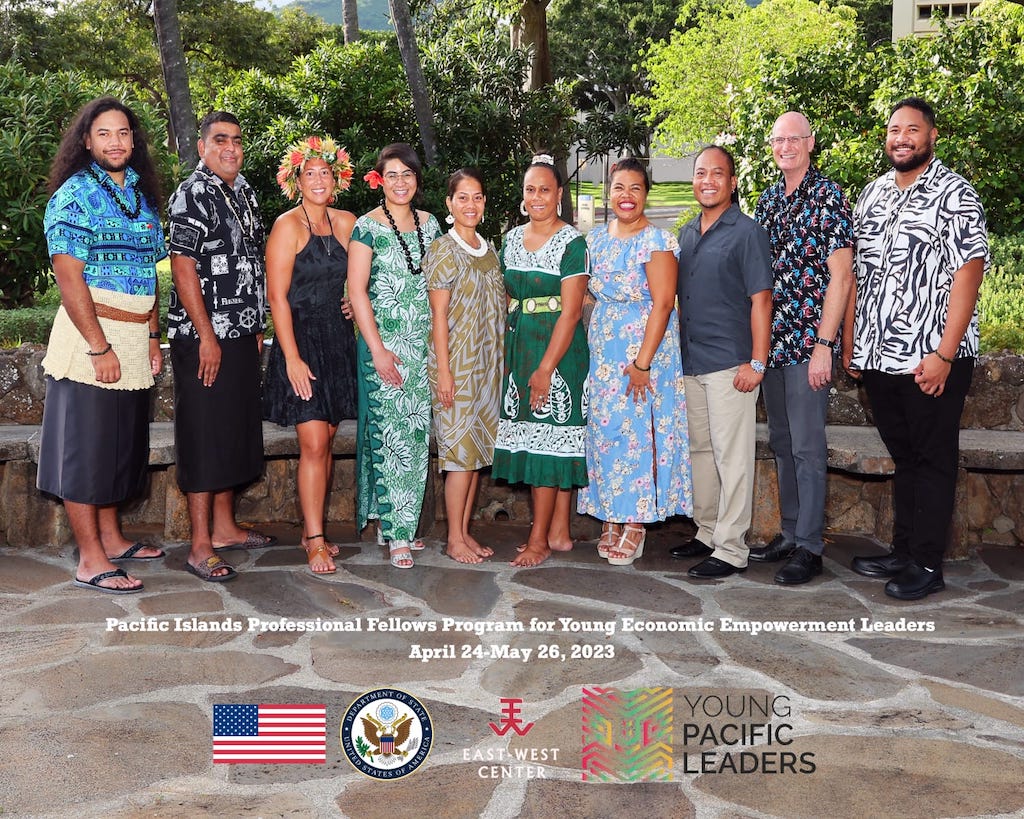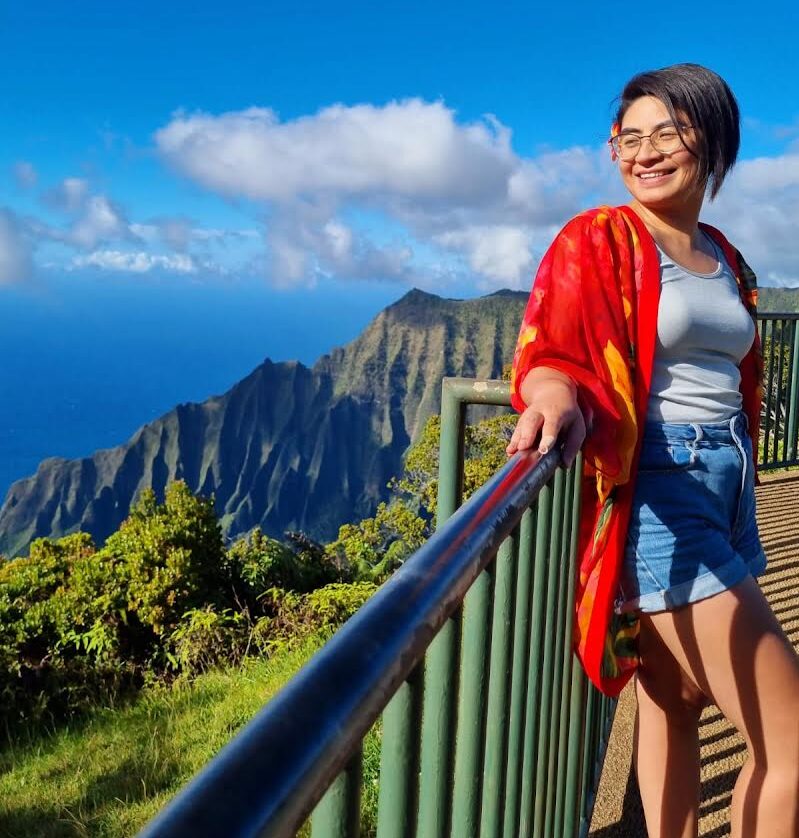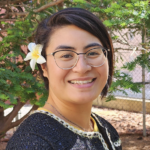
The East-West Center’s Professional Fellows Program for Young Economic Empowerment Leaders from the Pacific Islands is designed to build significant new capacity and facilitate enduring professional bonds between industry leaders in the United States and the Pacific Islands. Over the course of 3 weeks, chosen scholars work with an organization, business, or government agency in Hawai’i or another U.S. location based on their specific interests and learning objectives. The placements are tailored to each fellow’s interests, so the host organization and fellow learn as much as possible and can establish solid professional networks. Ultimately, the fellowship aims to identify opportunities for economic empowerment in communities facing these challenges. Three cohorts are sent per year.
Natalia Fareti was a member of the April-May of 2023 cohort of Young Economic Empowerment Leaders. Natalia spent the duration of her time in Hawai’i and Washington D.C., working to build a plan to help communities that were struggling financially after COVID-19. Below, Natalia talks more in-depth about what it’s like to be a Young Economic Empowerment Fellow, how she got there, and offers advice for anyone interested in applying!
Interested in The Professional Fellows Program for Young Economic Empowerment Leaders? Bookmark it to your free ProFellow Account!
Tell us about your background and professional journey. What led you to the Professional Fellows Program for Young Economic Empowerment Leaders from the Pacific Islands?
Economics isn’t usually seen as a particularly ‘sexy’ subject – it wasn’t uncommon for friends and others studying subjects like finance, the sciences, or law, to scrunch up their faces and declare it was confusing, had no absolute answers, or was tricky to pronounce! What drew me to study economics, was that it is a social science as much as it is a commercial one – how peoples’ circumstances and choices impact how they live, work, play, survive, and/or thrive – it affects all of us! I saw it like a confluence of the nature versus nurture debate, psychology, and commerce. Though as is often the case, theory can often be quite removed from reality, and models and frameworks are based on assumptions – which are subjective and not often contextualised for culture, location, or belief systems! I was keen to not just study, but also apply economics in a practical sense.
My interest was also fostered by growing up helping to run the family’s small food businesses – seeing my dad create his own opportunities when the white-collar culture wasn’t as open and diverse compared to today. Also seeing how customers’ moods and spending fluctuated with the different demands on their time and financial resources, and the ripple effects for the business and others.
In terms of professional roles I’ve had, I’ve worked in research and policy analysis in local government; worked as a research economist in the private sector across a variety of different projects including social housing, economic development strategies for iwi, social housing, agriculture, and transport; implemented different policies and initiatives under the Pacific Economic Strategy at the Ministry of Business, Innovation, and Employment; been a principal advisor to the Head of Regional Development, and manager of the risk, assurance, and governance team in the unit administering the $3 billion Provincial Growth Fund; and managed three teams across the portfolios of climate change, Te Ao Māori, and the South Pacific at the Reserve Bank of New Zealand. I am currently Director of Strategy, Policy, and Design at Toitū Te Whenua Land Information New Zealand.
Some of my voluntary and other roles outside of work include Co-Chairing the Wellington City Council’s Pacific Advisory Group, sitting on the boards of the Wellington Pasifika Business Network, and Y Greater Wellington (YWCA); and being Deputy Chair of the (NZ) Government Economics Network. I’ve been part of and remain involved in different Pasifika groups, particularly in my hometown of Te Whanganui-a-Tara, Wellington, including the Wellington Central branch of PACIFICA Inc.
I have always had a passion for helping our Pasifika people to thrive domestically here in Aotearoa, New Zealand as well as regionally and internationally. Too often we have been at the tail-end of multiple statistics when it comes to health, housing, and economic outcomes, and we face the largest ethnic pay gap here too. I am keen to help turn that around. I was looking for further opportunities to learn about how to further that mission –there are not that many Pasifika economists – so seeing ‘Pacific’ and ‘economic empowerment’ in the same sentence was like a beacon when I came across the Fellowship online!

Can you describe what a week in the life of a Fellow for this program is like? How did this opportunity allow you to advance your career and expand your professional network?
The first and last week was spent with my other Fellows, participating in informational sessions such as discussing indigenous models of entrepreneurship and leadership, exploring US-Pacific relations, and doing site visits. Our first week together, in Honolulu, Hawaii was spent visiting organisations that were helping to empower, upskill and support local communities – particularly indigenous, minority, and recent migrant populations – to become economically self-sufficient. The last week of the Fellowship was spent together in Washington, DC. There we met with a congressman, visited the Capitol, the Department of State, and the National Museum of the American Indian, and some of us got to visit our respective embassies/consulates.
The interim three weeks were spent at our respective work placements – all individualised to match our respective professional/community roles, and all themed around economic empowerment. My work placement was with the Hawaii State Government, working on the Hawai’i Economic Recovery Project, which is run by the small but great team within the Office of Planning and Sustainable Development (OPSD). That Office sits within the Department of Business, Economic Development, and Tourism.
While attending meetings alongside the OPSD team and doing some desktop research, I got some initial insights into how the Hawaii State Government was approaching economic recovery following Covid-19. But it was only when I got into the field and met with people from different organisations–such as businesses, economic development agencies, the Office of Economic Revitalization, economists and academics, and the Council for Native Hawaiian Advancement–that I really got to get a sense of what it was like on the frontlines locally, and what would be needed to strengthen recovery efforts in the future. Through these interactions, I gained an appreciation for both the differences and similarities, between American and NZ governmental systems and processes, as well as the challenges and opportunities facing businesses, and those facing indigenous and minority populations. Through these various engagements, I got to meet wonderful people who were similarly passionate about empowering local and indigenous populations. A highlight was being able to help connect people and ideas, not just with my own personal and professional networks, but also with each other locally. As they say, a problem shared is a problem halved – and conversely, success is best when it’s shared!
The Professional Fellows Program for Young Economic Empowerment Leaders from the Pacific Islands is committed to finding young economic leaders who are dedicated to helping their communities. Can you talk about your experience with your work placement? What did collaborating with the other fellows look like?
While we were all from different countries, we were all united by the Pacific Ocean, and there were common themes across our respective challenges and opportunities. One of these themes was the ongoing challenge of diversifying from the reliance on tourism as a predominant/primary source of revenue generation, faced with the constraints of varying population sizes, infrastructure, and funding.
Some of the lessons from the ongoing post-Covid-19 recovery in Hawaii included the pivot to destination management, embedding policies that had been introduced during Covid lockdowns–such as visitor number restrictions to popular tourist spots– and managing accommodation availability. These policies were a way to solidify the benefits seen from the lockdowns, where visitor caps saw the recovery and regeneration of natural environments such as coral reefs and wildlife stocks, as well as improving the quality of accommodation for tourists, and availability of local housing for residents.
The importance of having incubator spaces for testing new long-term solutions and ways of collaboration across the public, private, and non-governmental sectors, alongside communities, was also highlighted. This emphasis, alongside having a broader risk appetite to try new approaches – a safe space to test, fail, and iteratively improve, but over the longer term, and removed from political cycles– was another lesson that came through as a recommendation to build and improve long-term resiliency.

What advice do you have for others applying for the Professional Fellows Program for Young Economic Empowerment Leaders from the Pacific Islands?
Ironically enough – it’s to do what I had to tell myself in answering these questions – step outside your comfort zone! When I say that, it was a bit challenging in terms of providing answers where the word ‘I’ appeared more than I was comfortable with. For our Pasifika brothers and sisters, a common value across our islands is humility. In Te Reo Māori, there is a whakatauki, or proverb: “Kāore te kumara e kōrero ana mo tōna ake reka,” meaning, “the kumara (a sweet potato) does not brag about its own sweetness.” My default is to talk about ‘we’, rather than ‘I’ – but as is often the case when applying for programs and opportunities such as this, you are asked to talk about yourself in the first person.
For me, it’s about contextualisation – understanding the context in which you are, but without conforming – bringing your whole self to the situation. We are standing on the shoulders of giants, of those who came before us, and there are times when stepping into that discomfort and sharing your experiences and strengths, is a way to honour our families and loved ones who have supported, and continue to support, us on our journeys. They would want us to make the most of the opportunities out there.
It is also a chance for us to share our own perspectives, cultures, and values – and in doing so, challenge some of the systemic settings that are not, or never were, conducive to creating equitable outcomes for all communities, especially minority groups like Pasifika often are. We may be from small island nations, but our ancestors also traversed the biggest ocean on Earth! Taking that first step to apply is already a step into potential new opportunities, and you won’t know until you try!
On a practical level, really think about what you do, what you’ve done, and what you’d like to take away from this opportunity, and then relate it back to the Fellowship’s theme.
I had a wonderful experience on my Fellowship. I gained lots of valuable insights and networks professionally, but it was also enriching in terms of expanding my understanding, appreciation, and cultural knowledge of the USA and other Pacific nations. The program coordinators from the East-West Centre were also great and coordinated a varied and engaging program – my huge thanks to Scott Kroeker and the team! It was especially wonderful experiencing the Fellowship alongside my cohort – they are like another family now! That is something invaluable, which will endure far beyond the duration of the Fellowship.
The East-West Center offers numerous fellowships for students and professionals. Sign up to access the free ProFellow database, which lists several East-West Center fellowships, as well as more than 2,600 fellowships and fully funded graduate programs for all career levels.

© 2023 ProFellow, LLC, all rights reserved.